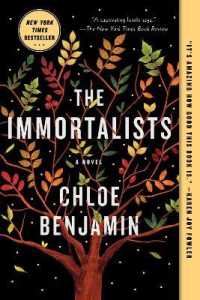- ホーム
- > 洋書
- > 英文書
- > Psychology
基本説明
邦訳:2006年2月、勁草書房(大堀寿夫・中澤恒子・西村義樹・本多啓【訳】)。「本書で著者が焦点を当てるのはヒトの認知の中でも種に特有な側面に限る。広い視野で見れば、ヒトの認知が伝統的な認知心理学の教科書の章立てのような要素、すなわち知覚、記憶、注意、カテゴリー化などから成り立っていることは確かである。だがこれらはみな、ヒトと他の霊長類に共通する認知プロセスである。ここでの私の説明は、これらを前提とした上で、そのような基本的スキルが、ヒトの認知という霊長類の認知の中でも特別なものに変貌していった進化論的、歴史的、個体発生的プロセスに、ヴィゴツキー的なやり方で焦点をあてていく。」
New in paperback. Hardcover was published in 2000.
Full Description
Ambitious and elegant, this book builds a bridge between evolutionary theory and cultural psychology. Michael Tomasello is one of the very few people to have done systematic research on the cognitive capacities of both nonhuman primates and human children. The Cultural Origins of Human Cognition identifies what the differences are, and suggests where they might have come from.
Tomasello argues that the roots of the human capacity for symbol-based culture, and the kind of psychological development that takes place within it, are based in a cluster of uniquely human cognitive capacities that emerge early in human ontogeny. These include capacities for sharing attention with other persons; for understanding that others have intentions of their own; and for imitating, not just what someone else does, but what someone else has intended to do. In his discussions of language, symbolic representation, and cognitive development, Tomasello describes with authority and ingenuity the "ratchet effect" of these capacities working over evolutionary and historical time to create the kind of cultural artifacts and settings within which each new generation of children develops. He also proposes a novel hypothesis, based on processes of social cognition and cultural evolution, about what makes the cognitive representations of humans different from those of other primates.
Lucid, erudite, and passionate, The Cultural Origins of Human Cognition will be essential reading for developmental psychology, animal behavior, and cultural psychology.
Contents
1. A Puzzle and a Hypothesis 2. Biological and Cultural Inheritance 3. Joint Attention and Cultural Learning 4. Linguistic Communication and Symbolic Representation 5. Linguistic Constructions and Event Cognition 6. Discourse and Representational Redescription 7. Cultural Cognition References Index








